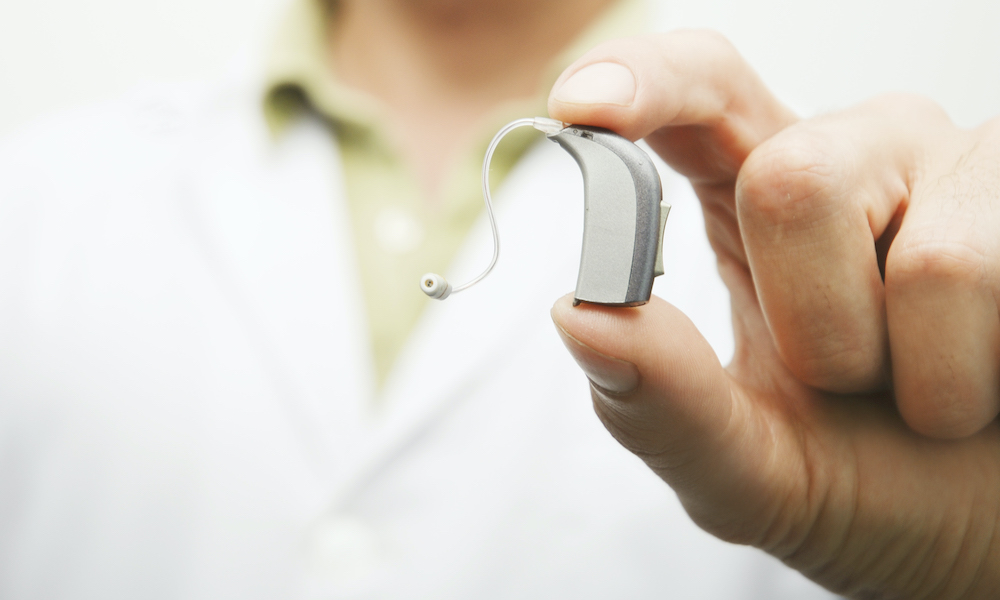Hearing amplifiers can help you hear better and cost less than hearing aids, but they aren’t for everyone. Hearing aids are regulated and require a prescription, while you can easily buy hearing amplifiers online and in drug stores. Compare hearing amplifiers and hearing aids to understand how they work before you buy either hearing solution.
How Hearing Amplifiers Work
Hearing amplifiers, also called personal sound amplification products (PSAPs), make sounds in the surrounding environment louder. These electronic devices are available in many of the same styles you find in hearing aids, like behind-the-ear (BTE) or in-the-canal (ITC). Some hearing amplifiers resemble headphones.
Hearing amplifiers cost as little as $50, but studies show you should plan on spending around $300 or more per ear for high-quality products. The Food and Drug Administration (FDA) doesn’t regulate amplifiers, so you don’t need a prescription to buy them.
Hearing amplifiers can help with low-level hearing loss but may not differentiate between the sounds you want to hear and those hearing aids filter out. An example is in a restaurant where you want to listen to the conversation at your table while background noise is muffled.
Hearing Aid Styles and Costs
You’re probably familiar with hearing aids, which have been around since 1902. Today you can choose from many types of hearing aids, including some that are small enough to go unnoticed in your ears. You’ll need a prescription to buy traditional hearing aids because they are medical devices requiring a doctor’s diagnosis to treat specific types of hearing loss.
The latest hearing aid models use cutting-edge technology and cost anywhere from $850 to thousands of dollars per ear. The cost usually includes a professional hearing assessment, fitting and adjustments. Some Medicare Advantage plans pay for hearing aids, but other insurances provide minimal or no coverage. The FDA regulates hearing aids for consumer safety.
Get a Hearing Exam
Even if you’re confident you would benefit from a hearing amplifier, see a hearing care professional to find out if you have a medical hearing loss. You could have a growth, tumor or other treatable medical problem that’s interfering with your ability to hear well. The solution could also be as simple as a change in medication or having a wax plug removed to clear the ear canal.
You could suffer from a higher degree of hearing loss later on if you don’t rule out medical issues. The money saved by using a hearing amplifier without getting tested can cost you more down the road if you delay a diagnosis.
Do Hearing Amplifiers Work?
Consumer Reports tested hearing amplifiers using individuals with mild to moderate hearing loss. The results showed that some hearing amplifiers can improve hearing, but how much depends on the product quality. Properly fitted and adjusted devices might work unless you have severe to profound hearing loss.
A controlled study by the Journal of the American Medical Association (JAMA) compared hearing aids to hearing amplifiers. The results were that both devices helped significantly with understanding speech. The National Academy of Sciences also reported that some amplifiers have technical and performance characteristics that are very similar to hearing aids.
All three experiments clearly indicated that you get what you pay for with hearing amplifiers. The inexpensive models did nothing to improve hearing. Some of these models also over-amplified loud, sharp sounds, which could lead to further hearing loss.
Should You Buy Hearing Amplifiers?
There are varying degrees of hearing loss with several causes. The bottom line is that you should have a hearing test with an exam whether you intend to buy hearing aids or amplifiers.
If testing indicates that you don’t need hearing aids, consider hearing amplifiers with features that prevent sounds loud enough to further damage your hearing.
If you learn you need hearing aids, you can still save money by purchasing a third option: Direct-to-consumer (DTC) hearing aids. Recently FDA-approved for use without a prescription, DTC hearing aids range from basic to high-tech models.
For additional information about hearing aids, see our Best Hearing Aids guide.

